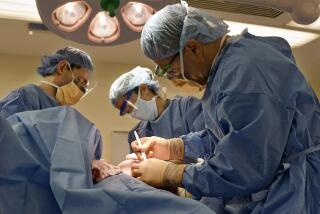Breast-conserving cancer surgery often needs to be repeated
One in five women who undergo breast-conserving surgery for cancer instead of a mastectomy require a second operation within three months, British researchers reported this week. The survival rates for breast-conserving surgery combined with radiation and for mastectomy are about the same, but the need for a second operation can introduce extra anxiety for the patient, as well as additional cost. The need for a reoperation was most common for women with ductal carcinoma in situ, a form of cancer whose edges are very difficult to define for removal of the tumor.
An estimated 45,000 women in England are diagnosed with breast cancer each year, and 58% of them have breast-conserving surgery, which makes cosmetic repair of the body easier. In the United States, about 450,000 women are diagnosed with the disease each year.
A team headed by Dr. David A. Cromwell of the London School of Hygiene & Tropical Medicine studied the records of 55,297 women who underwent breast-conserving surgery between April 1, 2005, and March 31, 2008. They reported this week in BMJ, formerly known as the British Medical Journal, that 11,032 (20%) had at least one reoperation. Among women with isolated invasive disease, 18% had a reoperation, but among those with ductal carcinoma in situ, 29.5% had a reoperation. The actual rates of reoperation varied somewhat with the region of the country.
Rates in the United States might actually be higher. A study of four large U.S. hospitals reported in February in the Journal of the American Medical Assn. reported that 23% of the patients receiving breast-conserving surgery underwent a reoperation.
Most oncologists warn women considering breast surgery about the potential need for reoperation, but the new study is among the first to actually quantify the rate of such procedures. “Before this study, it was unclear what that risk was,” Cromwell said, “but now women can be better informed.”
Twitter/@LATMaugh






